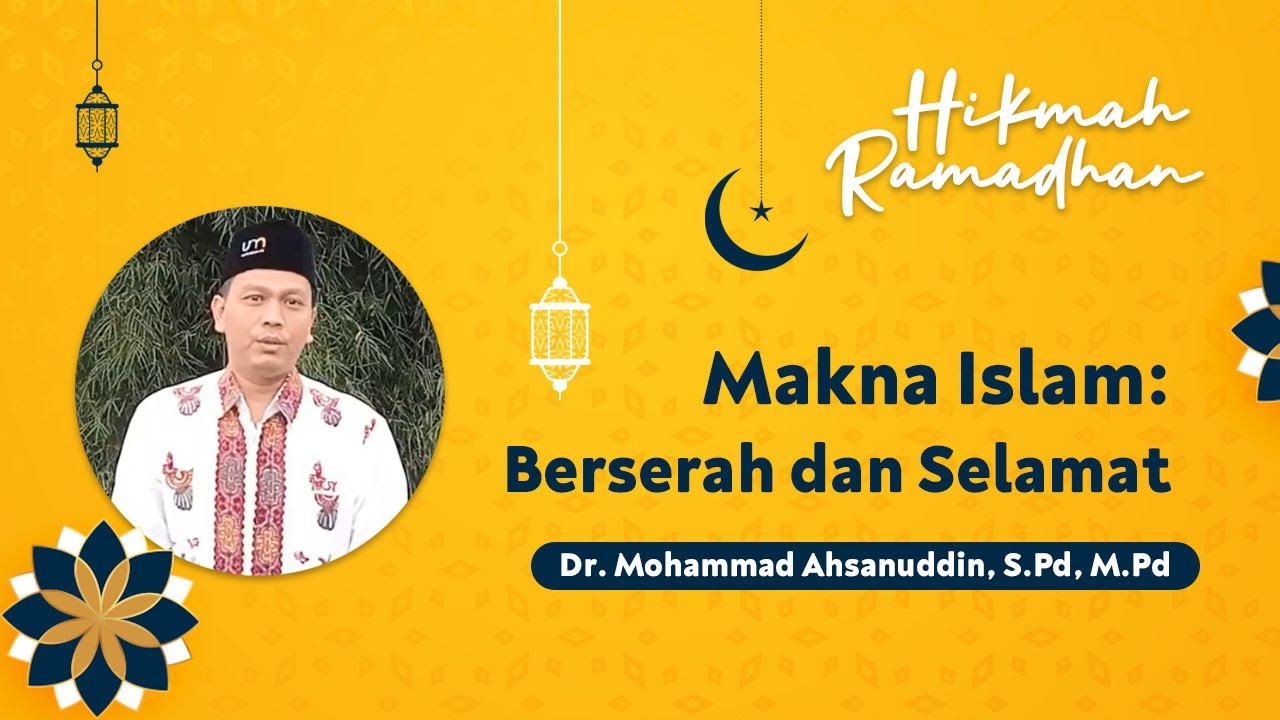AKHLAK DALAM ISLAM
Summary
TLDRThe lecture begins with an Islamic greeting and praise to Allah, followed by a discussion on 'Akhlaq' (morals) in Islam. The speaker explains the etymology and meaning of Akhlaq, emphasizing that it refers to inner traits that manifest spontaneously without external pressure. The sources of Akhlaq are the Quran and Sunnah, with its scope extending to all aspects of life. The speaker also highlights the significance of Akhlaq in Islam, its relationship with faith, and the five key characteristics of Islamic morals: divine, humanistic, universal, balanced, and realistic.
Takeaways
- 🙏 The speech begins with praise to Allah and salawat upon the Prophet Muhammad (peace be upon him), seeking blessings for the gathering.
- 📚 The lecture is on the topic of 'Akhlaq' (Islamic ethics/morality), and it covers definitions, sources, scope, significance, and characteristics of Akhlaq in Islam.
- 💡 Akhlaq, linguistically, comes from the Arabic word 'khuluq', meaning character or behavior. It reflects a connection between God's will and human behavior.
- 💖 Akhlaq, by definition, refers to an ingrained trait in the soul that makes actions spontaneous without the need for external prompts or thinking.
- 🌟 True Akhlaq is evident when good actions are performed consistently and without external motivation, such as donating without being persuaded.
- 📖 The primary sources of Akhlaq in Islam are the Quran and Sunnah, not societal norms or human reasoning, as these can be relative and subject to change.
- 🕌 The scope of Akhlaq in Islam is vast, covering behavior toward Allah, the Prophet, oneself, family, society, and even the state.
- 🚀 The importance of Akhlaq in Islam is underscored by the Prophet's mission to perfect moral conduct, and it is a central part of a Muslim's faith.
- ⚖️ Good Akhlaq will heavily weigh in favor of a believer on the Day of Judgment, and it is linked to one's level of faith and quality of worship.
- 💫 The five key characteristics of Islamic Akhlaq include being divinely sourced (Rabbani), humanistic, universal, balanced, and realistic.
Q & A
What is the etymological meaning of 'akhlak' in Arabic?
-'Akhlak' is derived from the Arabic word 'khuluq,' meaning character, behavior, or nature. It also comes from the root 'kholako,' which means 'to create,' indicating a link between human behavior and the Creator's will.
What is the terminological definition of 'akhlak' in Islam?
-Akhlak is a trait embedded within a person that arises spontaneously without external prompting, intellectual deliberation, or prior thought. It becomes part of one's nature, emerging naturally and repeatedly.
How does one develop 'akhlak' according to the speaker?
-Akhlak requires continuous practice and repetition until it becomes an intrinsic part of a person's behavior. It is not something that is externally motivated but must develop into an automatic response.
What are the sources of akhlak in Islam?
-The primary sources of akhlak in Islam are the Quran and Sunnah. Unlike human opinions or societal norms, these divine sources provide absolute truth, making them the foundation for determining right and wrong.
What is the relationship between akhlak and ibadah (worship) in Islam?
-Akhlak is considered the outcome and reflection of proper worship. Acts of worship like prayer, fasting, and zakat should cultivate good character. For example, a true prayer should prevent immoral acts, showing the link between worship and behavior.
What is the significance of akhlak in the teachings of Prophet Muhammad (PBUH)?
-Prophet Muhammad (PBUH) emphasized that he was sent to perfect good manners. Akhlak is considered one of the core aspects of Islam, reflecting the quality of a person’s faith and determining their weight of good deeds on Judgment Day.
What are the six areas of akhlak's scope mentioned in the lecture?
-The six areas include: akhlak towards Allah, akhlak towards the Prophet, personal akhlak, akhlak within the family, akhlak in society, and akhlak within the state.
What are the five characteristics of Islamic akhlak?
-The five characteristics are: 1) Rabbani (Divinely inspired), 2) Humanistic, 3) Universal, 4) Balanced, and 5) Realistic. These traits ensure that Islamic akhlak aligns with human nature, applies universally, balances spiritual and worldly life, and acknowledges human weaknesses.
How does Islam view akhlak in terms of societal influence?
-Akhlak is not conditioned by societal norms, which may change. Instead, it is grounded in the eternal principles of the Quran and Sunnah, transcending situational and cultural changes.
Why does the speaker emphasize prayer for good akhlak?
-The Prophet Muhammad (PBUH) often prayed for guidance towards good akhlak and protection from bad character. This highlights that even with self-discipline, believers should seek divine assistance to maintain good morals and avoid negative traits.
Outlines

Esta sección está disponible solo para usuarios con suscripción. Por favor, mejora tu plan para acceder a esta parte.
Mejorar ahoraMindmap

Esta sección está disponible solo para usuarios con suscripción. Por favor, mejora tu plan para acceder a esta parte.
Mejorar ahoraKeywords

Esta sección está disponible solo para usuarios con suscripción. Por favor, mejora tu plan para acceder a esta parte.
Mejorar ahoraHighlights

Esta sección está disponible solo para usuarios con suscripción. Por favor, mejora tu plan para acceder a esta parte.
Mejorar ahoraTranscripts

Esta sección está disponible solo para usuarios con suscripción. Por favor, mejora tu plan para acceder a esta parte.
Mejorar ahoraVer Más Videos Relacionados

KI BOCIL‼️RAMADHAN KE 4‼️FAHRIA ZILDA IBRAHIM SDIT AL MISBAH

Akhlak Kepada Allah | M. Quraish Shihab Podcast

Makna Islam: Berserah dan Selamat | Dr. Mohammad Ahsanuddin , S.Pd, M.Pd | Hikmah Ramadhan 2022

KAJIAN UTUH MENGENAI WAHYU BAGIAN 1 | Ust. M Fatikhun, S.Ag., M.H.

Pentingnya Bahasa Arab (Ust. Muhammad Khaerul Hadi, S.Pd.)

(Kupat) Kultum Mudupat 1446 H || Menghindari Perbuatan yang Merusak Ukhuwah || Rania Arshiya Sani
5.0 / 5 (0 votes)
